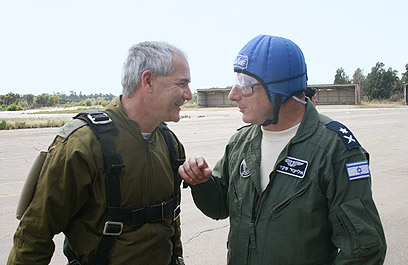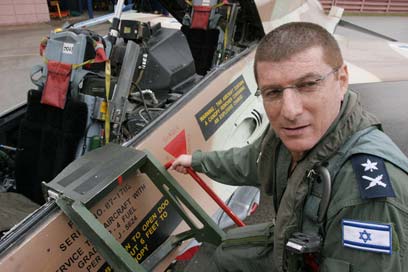
Outgoing Israeli Air Force commander, Major-General Eliezer Shkedy, believes silence is golden – in general, but especially when it comes to the matter of the destruction of the North Korean reactor infrastructure in Syria, in September of 2007.
The mere mention of the subject sees Shkedy immediately enshrouding himself in silence. The various foreign publications which covered the operation all concluded it was a highly skilled operation, well proportionalized, meticulously executed and a well kept secrets; his fingerprints are all over the proverbial scene, but he knows nothing about it.
The soon to be for former IAF chief is very much like the operation he knows nothing about – quiet, thorough, decisive: "I love the operational aspect of things, especially finding solutions to seemingly unsolvable situations," he said.
"I love seeing an answer materialize and not just theoretically. That's true when in comes to fighting terror and when it comes to more complex matters."
Can you point out one career-defining moment, one worth all the hard work over the year, one which proved pivotal to Israel's safety?
"There have been many moment over the years which I felt were of true importance to the state of Israel… when I felt that I have exhausted both my abilities and those of the IAF's in the deepest sense."
The collector
That, it seems, is Shkedy's motto: When he was named IAF chief four years ago, he announced he would not be heading the military's air force, but rather the Jewish people's air force.
"I feel like I'm on a mission – to ensure the existence of the people, this country and our dream and I'm not ashamed to say it," he said.
Do you really think that even in the 21st Century Israel is still under threat of annihilation?
"I will not close my eyes to the fact that a leader of a sovereign nation thinks it's okay to get up before the entire world every few weeks and preach the destruction of Israel. We already saw a leader like that, some 70 years ago, and yes – things a different now, but I will not ignore the situation."
Shkedy admits that when in comes to Iran, he obsessively collects every piece of information he can get his hands on: "I read everything. Understanding what (Iranian President Mahmoud) Ahmadinejad says is crucial, as is understanding (Ayatollah Ali) Khamenei… What's happening in Iran is bigger than one political figure or another.
_wa.jpg)
Hungry for information (Photo: Yaron Brener)
"The Iranians are pursuing not only uranium enrichment. They also have a plutonium program. They have overt avenues and I'm convinced they have covert ones. They're doing everything they can to transport materials across Iran."
No dilemma beyond solution
Whoever heads the Israeli Air Force is, in essence, tasked with building Israel's strategic, long-range force. Is the IAF capable of dealing with an existential threat?
"I believe that there is no operational quandary beyond solution. I dedicate all of my time, energy, intelligence – my all – to making sure we have every option available.
Where does the Iranian nuclear program stand?
"There are three things we have to pay attention to: One – what they say and what they mean. Anyone who thinks their statement shouldn't be taken seriously is welcome to prove it. Two – the enrichment programs. There's no debate there. Three – their effort to get hold of missiles, jets, cruise missiles, air defense systems. This is the mirror. You have to look at it."
Eventually, he said, "A month here, three months there – that won't be what makes the difference."
Do the Iranians have cruise missiles?
"They have Ukrainian cruise missiles"
The Hetz missile is no match for that. What should we do?
"It's not simple, but we have some courses of action."
Are they or aren't they a year away from having nukes?
"It's a very complex situation and any assessment is tricky. Our regional realities are beyond imagination and nothing can be excluded. They can achieve nuclear capability at any given time."
So do we or don't we pull out worst-case scenarios of death doom and destruction?
"We're not there yet," he tenses up, "and I hope we won't get there, either."
Iran is more than one front. It's also appears in the context of Syria, Hamas and Hizbullah.
"I don’t like to use inflated terms like 'military superpower', if nothing else for the fact that creates an illusion of sorts, but Israel is a very powerful nation, with considerable deterrence, which in many ways is improving. The other side, both near and far, knows better than to mess with us."
The primary mission
Israel has been dealing with rockets for dozens of years to no avail. So how do we deal with tens of thousands of rockets from Lebanon and Syria? How do we deal with Hamas' Qassam rockets? Where has the Air Force been all this time?
Shkedy clams up. He refuses to criticize his IAF predecessors, ground forces counterparts or those pulling the political reign. He would much rather discuss the development of defensive measures, like the Iron Dome system aimed at protecting the Gaza vicinity communities and the Magic Wand system, aimed at tackling mid-range missiles.
"Any fighting in the near future will see various kinds of rockets fired on Israel. We're seeing a relatively low amount of rocket fire in the south today – compared to their firing ability." Hamas, he added, is also not far from increasing the rocket range – by at least 12 miles.
"The Gaza border is wide open. They have no problem smuggling anything, even Katyusha rockets. They've smuggled antiaircraft missiles in Gaza as well," he said.
They've not only smuggled antiaircraft missiles – they've used them.
"We don’t know that for sure, but there are some signs indicating they've used missiles on our jets. To the best of my knowledge, they have all kind of advanced missiles."
When you took office, you said you saw fighting terror as the primary mission. What would you recommend be done at this point in time?
"I won’t discuss any of the political echelon's decisions but I think that this kind of rocket fire for a prolonged period of time, is unacceptable. Solving this situation requires complex, integrated operations… our aerial forces are doing unbelievable things in Gaza Strip; the corps' routine security operations have never been so extensive. If five years ago only 5% of the terrorist were targeted from the air, today 50% to 70% are hit in aerial strikes. "
Three months ago, the government ordered the military to put a stop to the rocket fire. Why can't you do that? Are your hands tied?
"I will not comment on our inner workings… I will say that there is a decline in the incidents involving hurting innocent bystanders, which is – of course – against our code of ethics. It's not all the IAF's doing – it’s the result of the collaboration with the Southern Command, the Shin Bet, Military Intelligence and the military industries... There is nothing like it in any other country in the world. I have air force commanders from all over the world, wanting me to teach them how we do it."

Cooperating in full. With head of the GOC Army Headquarters, Maj.-Gen. Avi Mizrahi (Photo: IDF Spokesperson's Unit)
The armament in Gaza is continuing in a frantic rate. What are we waiting for?
Shkedy confirms that over 1,000 Palestinians have left Gaza in order to receive military training in Lebanon, Iran and Syria, than poses for a while. "I can only assume that if things in Gaza continue as they are, an aggressive operation in the Strip will be unavoidable. They continue the armament, the rocket fire – and they are increasing they're range. It won't be long before a large area of Israel may be under threat, and if they'll persist, an operation is inevitable."
A wide-scale operation means a large number of civilian casualties.
"An aggressive operation means casualties on both sides and we have to remember that – we will suffer some casualties as well… aggressive measure will be mandatory in order to minimize our casualties."
What about the tensions with Syria? They exude confidence and seem war ready, but they also assume Israel won't repeat the mistakes of the summer of 2006, and won't launch a campaign longer than 30 days.
Syria, he said, did get some SA-22 missiles from Russia and its aerial defense array is undoubtedly one of the densest out there, but he has no intention of laying out any battle plans. He does, however, agree that one of the most important lessons learnt in the Second Lebanon War is the need to need for a swift operation: "When the home front is in the line of fire, swift measures carry greater significance."
Air Force dominance
Shkedy and former IDF Chief of Staff Lieutenant-General Dan Halutz were bothers in arms, but something soured between them: "I have nothing but admiration and respect for Dan Halutz. He did great things both as the IAF chief and the chief of staff. I can only regret the way things ended."
The two of you were harshly criticized during the war, for not going into war mode sooner, for not supporting the ground troops properly, for playing it safe.
"I'm very proud of the IAF's conduct during the war. I order the corps to change DEFCON (defense readiness condition) on the first day of fighting," he said and immediately quotes the Winograd Report: "We commend the air force, which had notable achievements during the war and based its operations on a carefully planned outline… the IAF executed many unplanned missions well… it role in Israel's power of deterrence in unquestionable."
There are some in the military, maybe even in the air force, who claim you didn't take enough risks in assisting the ground troops.
"I won't even dignify that claim. Let's talk facts: The first and foremost lesson learnt from the (first) Lebanon War was that misidentification by our forces caused dozens of friendly fire casualties. There are rules and regulations as to where and how you strike, so that even if a missile misses its target, our forces will not be severely harmed.
"I personally authorized 900 raids outside safety parameters in order to help ground troops… We have to make crazy decisions everyday and no day is like the one before. Our people make a tremendous effort and I trust them; and if they get something wrong, I'll back them up. They have to go back out there and fight. You've never heard me say anything about the ground troops. It's unethical."
There were claims that helicopters failed to evacuate the wounded on time.
"As for the injured – 95% of all those severely wounded were airlifted by helicopters flying three miles into enemy airspace, 50% of them in broad daylight… two of our squadrons were awarded the Chief of Staff Commendation for that. As far as supplying provisions, once we found out the ground forces were in distress, we went against all combat doctrines and had Hercules (transport) plains fly in at zero altitudes and drop supplies."
What about the claims that the Air Force's cooperation with other military branches was lacking?
"Cooperation is built through training. The gourd forces had very little training prior to the war and when there's little training in general there's little training with the air force. Nowadays they're in full training and we are training with them."
Is one of the war's conclusions that an air force commander can't be the chief of staff?
Shkedy categorically disagrees: "There is a certain problem with the chief of staff being the commander in chief of the entire army on one hand and the high commander of the ground forces on the other… but there have been ground operations which have been supervised by the air force; so can the air force dominate the ground forces? Absolutely."
What about the Hizbullah's continuing armament?
"Their continuing armament is definitely cause for concern, but the any decision on appropriate actions is up to the government."
Is our constant flying over Lebanon creating tension?
"They're building a military alignment down there that I have to know about. I need intelligence in case I'm required to devise a military move."
Love of a lifetime
Is being the IAF chief a 24/7 job?
"This is all I do. I put my heart and soul into it. Figuratively speaking, we don’t sleep so you can. Beyond the day-to-day operations, I just love flying plains. I fly every week – transport plains, choppers, fighter jets – anything I can."

Just loves flying (Photo: Amit Magal)
Despite my best efforts, I couldn't find anyone who dislikes you. How is that possible?
"Truly caring about people really does mean something at the end of the day. When I have something to say to someone, I'll do it here, inside these four walls. That's the only way to go: If you want to praise someone – do it in public. If you want to say anything else – do it in private."
You're on your way out. Soon the phones will stop ringing. Then what?
"As long as I'm in uniform I refuse to think about the day after… I feel I've chosen a path of great importance. I can look my father in the eye hoping I did what was expected of me. He never said so, but he always wanted me to be an officer."
Any regrets?
"None."
- Stay focused















